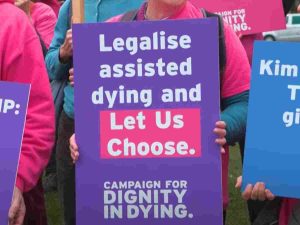In recent months, multiple cases of people living with severe myalgic encephalomyelitis (ME, also referred to as chronic fatigue syndrome, CFS) being neglected and mistreated by the UK’s NHS have come to light. This is despite improvements in official guidelines – and historical outcry over medical professionals’ treatment of people living with the disease. So, one organisation is demanding the government acts – and you can get involved too. However, it may take more than this to change the health service’s institutionalised failures around ME.
What is ME?
ME is a chronic disease that affects almost every system in people’s bodies – like the immune, nervous, digestive, and hormonal systems. Many of its symptoms majorly impact a patient’s day-to-day life – like cognitive impairment, profound and disabling fatigue, influenza-like symptoms, heart, lung, temperature, and blood pressure dysfunction, hypersensitivities, and digestive dysfunction.
However, the main symptom which sets ME aside from other illnesses is called post-exertional malaise (PEM), the NHS Scotland website says. Oddly, NHS England’s website makes no mention of this. PEM is a worsening of many, if not all, the body’s systems, as well as symptoms, after physical, mental, or emotional exertion.
Research has shown people with ME have a worse quality of life than many cancer patients, people living with type I diabetes, and stroke survivors.
In its worst form, people with severe or very severe ME often cannot eat or drink, are permanently bedbound or hospitalised, cannot sit or stand up, and are completely reliant on others for their care. However, crucially ME can kill people – and has.
In 2021, Maeve Boothby O’Neill died from very severe ME at the age of 27 after the NHS allegedly neglected her. Doctors denied her a feeding tube, and later denied total parenteral nutrition, which could have saved her life. An inquest into Maeve’s case is ongoing. Her father, journalist Sean O’Neill, wrote about his daughter’s story for the Times.
Sadly, Maeve’s case is not uncommon – and moreover, the situation feels like it’s getting worse.
Severe ME patients: the NHS leaving them to rot
The Canary has documented multiple cases of the NHS leaving people living with severe or very severe ME at risk – or causing them harm. Most recently, there have been multiple reports on social media of doctors attempting to psychologise these patients’ physical illnesses. That is, medical professionals are saying that it is ‘all in their heads’, offering the patients psychiatric assessments and/or interventions.
For example, Karen Gordon has lived with severe ME for nearly 20 years. During 19 of those, doctors tube fed her – mostly at home. However, in March last year the NHS hospital whose care she was under threw her so-called ‘care’ into chaos.
Doctors started to break National Institute for Clinical Excellence (NICE) guidelines over her care. It refused to continue tube feeding her, and said she had to go 100 miles to a hospital in London. This level of travel is completely unsuitable for someone with severe ME.
Karen declined – so, the hospital at that time discharged her, leaving her in potentially life-threatening situation. However, after media attention, a petition, and the strength of mind of both Karen and her family, the NHS started treating her again.
However, as of 10 February 2024 the NHS is still not correctly treating Karen – as an update to her petition explained here.
The government must act
Karen’s situation is a microcosm of the dangers the NHS presents to severe ME patients. So, social enterprise ME Foggy Dog is trying to do something about this. In 2023, it, Stripy Lightbulb CIC, and campaign group the Chronic Collaboration designed guidance for MPs to be able to intervene in people’s cases.
Now, ME Foggy Dog has written an open letter to health secretary Victoria Atkins. You can read and sign it here. It states:
Despite the severity and prevalence of this illness, there is a glaring absence of specific protocols within the NHS to cater to the complex needs of individuals with severe ME. Consequently, many patients are left without adequate medical attention, facing significant barriers to accessing appropriate care and support.
ME can sometimes be fatal and patients have died from malnutrition as a direct result of neglect, stigma, and a poor knowledgebase in NHS hospitals. In 2024, medical professionals who understand the complex nature of the disease and who contemplate ‘off label’ treatments are finding themselves at risk of referral to the General Medical Council [GMC] due to the lack of a NHS protocol.
It calls on Atkins and the Department for Health and Social Care (DHSC) to enact four meaningful elements across a severe ME protocol. You can read them here.
Severe ME: inappropriate NHS care “frighteningly routine”
ME Foggy Dog told the Canary:
Severe ME patients receiving inadequate or inappropriate care is frighteningly routine in the UK.
Desperate patients and their families find doctors either don’t listen to concerns or want to help but risk referral to the GMC in the absence of an NHS protocol. There have been far too many preventable deaths caused by the poor knowledgebase within the NHS on severe ME, the false stigmatising beliefs of some medical professionals, and the fragmented healthcare system surrounding the disease.
We need the DHSC and NHS to comprehend the seriousness and urgency of this protocol issue.
ME patients have been subject to decades of abuse and neglect by medical professionals, institutionalised psychologisation and gaslighting by the health system, and failures by the state and its services.
Now, and despite updated NICE guidelines, the work of charities, and persistent campaigns by some of the most chronically ill people in the UK – the NHS treats all ME patients like it’s the previous century.
It begs the question how much longer must these people tolerate this? And exactly what lengths to patients and their advocates need to go to to change things?
Featured image via bialasiewicz – Envato Elements




